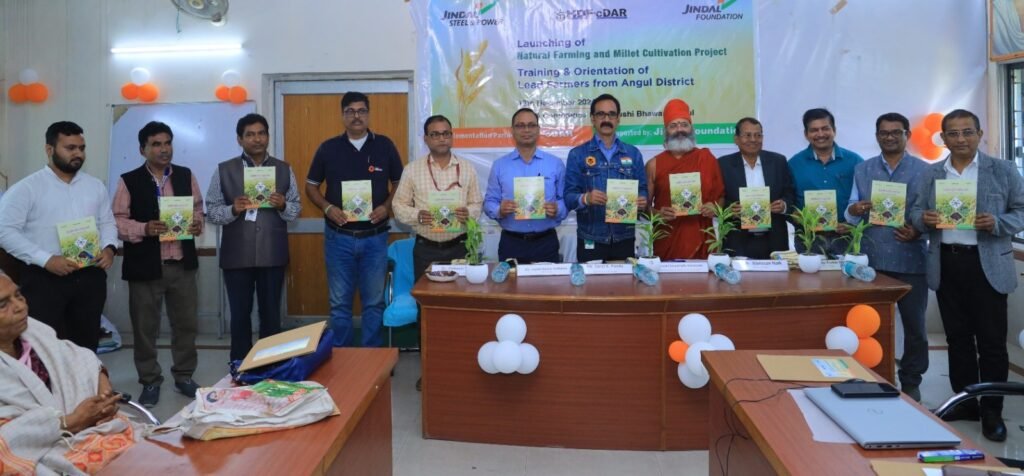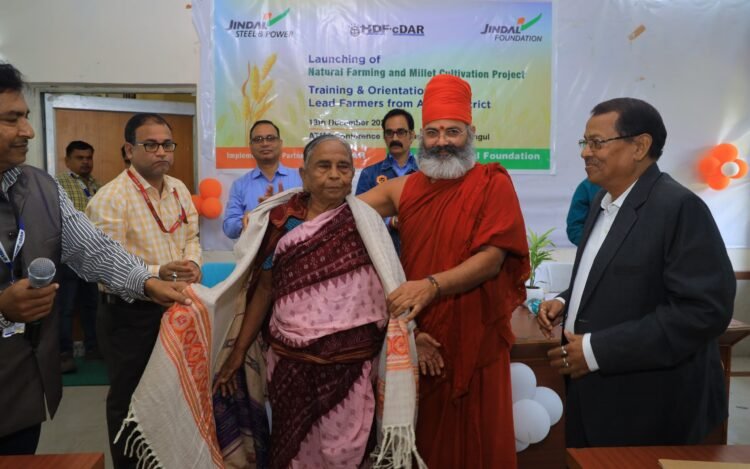By investing in such innovative agricultural solutions, the Jindal Foundation is setting a benchmark for CSR-driven initiatives that prioritize both people and the planet.
ANGUL (India CSR): The Jindal Foundation, in collaboration with HDF-cDAR, has launched a groundbreaking Natural Farming and Millet Cultivation Project in Angul, Odisha, marking a significant step towards sustainable agriculture and ecological restoration. The project’s pilot phase spans 200 acres, with 150 acres dedicated to millet cultivation and 50 acres to vegetable farming across JSP’s peripheral villages. Additionally, it includes the creation of 500 kitchen gardens and the plantation of 10,000 fruit-bearing saplings, aiming to empower farmers and restore ecological balance.
1. Empowering Farmers Through Sustainability
This initiative is designed to provide farmers with sustainable livelihood opportunities while enhancing soil fertility and promoting eco-friendly farming practices. The millet cultivation on 150 acres seeks to support India’s nutritional goals, while the vegetable farming on 50 acres caters to local consumption and income generation. The 500 kitchen gardens will allow families to grow their own nutritious food, reducing dependence on external sources. The plantation of 10,000 fruit-bearing saplings not only restores green cover but also creates a future source of income for farmers.
2. Ecological and Community Benefits
The project’s innovative approach addresses critical challenges in agriculture, including soil degradation, loss of biodiversity, and limited access to sustainable farming techniques. Through the kitchen gardens and sapling plantations, it fosters a sense of ownership among farmers, encouraging them to adopt natural and regenerative farming methods.

“By focusing on millet, vegetables, and fruit-bearing trees, we are creating a farming model that is both economically and ecologically viable,” said Naveen Jindal, Chairman of Jindal Steel & Power (JSP).
3. Expert Guidance and Collaborative Efforts
The launch event featured technical sessions by agricultural experts such as Mr. Anshuman Patnaik and Mr. Paresh Kumar Bhanja, who educated farmers on zero-investment natural farming and pest management. Dr. Debasis Mishra, Senior Scientist & Head, KVK Angul, provided valuable insights into improving soil health and sustainable cultivation.
Key stakeholders, including government officials, CSR leaders, and local authorities, joined hands to support the initiative. Dignitaries like Mr. Dilip Kumar Mishra, Chief District Agriculture Officer, Angul, and Amber Lugunu, Deputy Director Horticulture, praised the project’s impact on sustainable farming and community welfare.

4. JSP’s Commitment to a Greener Future
JSP’s Natural Farming and Millet Cultivation Project is part of its larger commitment to promoting sustainable agriculture and improving the lives of rural communities. The pilot phase serves as a model for scalable, eco-friendly farming solutions that address environmental and social challenges while enhancing livelihoods.
The establishment of 500 kitchen gardens and the plantation of 10,000 saplings reflect JSP’s mission to ensure food security and ecological restoration through its CSR efforts. These initiatives align with national priorities of fostering sustainable farming and empowering farmers with modern techniques.
5. The Natural Farming
Natural Farming is an eco-friendly agricultural practice that relies on minimal external inputs and emphasizes working in harmony with nature. It is a farming method that avoids synthetic chemicals such as pesticides, fertilizers, and genetically modified organisms (GMOs), focusing instead on sustainable practices that enhance soil fertility, biodiversity, and the health of crops.
©IndiaCSR







